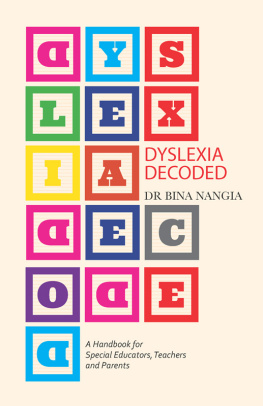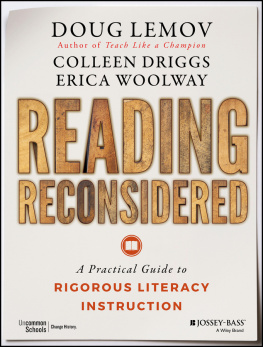Why cant U teach me 2 read?
Why cant U teach me 2 read?
THREE STUDENTS AND A MAYOR PUT
OUR SCHOOLS TO THE TEST

BETH FERTIG
Farrar, Straus and Giroux
New York
Farrar, Straus and Giroux
18 West 18th Street, New York 10011
Copyright 2009 by Beth Fertig
All rights reserved
Distributed in Canada by D&M Publishers, Inc.
Printed in the United States of America
First edition, 2009
Library of Congress Cataloging-in-Publication Data
Fertig, Beth, 1966
Why cant U teach me 2 read? : three students and a mayor put our schools to the test / Beth Fertig. 1st ed.
p. cm.
Includes bibliographical references.
ISBN: 978-0-374-29905-7 (hardcover : alk. paper)
1. ReadingRemedial teachingNew York (State)New YorkCase studies. 2. Reading disabilityNew York (State)New YorkCase studies. 3. Children with disabilitiesEducationNew York (State)New YorkCase studies.
4. New York (N.Y.). Board of Education. I. Title. II. Title: Why cant you teach me to read?
LB1050.5.F46 2009
372.4309747'1dc22
2009011520
Designed by Jonathan D. Lippincott
www.fsgbooks.com
1 3 5 7 9 10 8 6 4 2
Contents
Why cant U teach me 2 read?
Prologue: Lost
Yamilka was just trying to take the subway home from school. It was a Monday evening in July 2006, a few weeks after her twenty-third birthday. She left her class on the Upper East Side of Manhattan at around 5:30 and went to exercise at a gym a block away on Eighty-sixth Street, using a guest pass her teacher had given her. She then walked another block to the subway on Lexington Avenue and caught the number 4 train to the Bronx. Yamilka lived with her parents and three siblings in an apartment in Morris Heights. It was a ten-minute walk from the Mount Eden Avenue station, three stops north of Yankee Stadium. The train ride normally took about half an hour.
Everything seemed normal when Yamilka got on board during the evening rush. But then the train zipped past her stop because of some track work and kept on going. Yamilka was frozen with terror and a feeling of helplessness.
Yamilka was illiterate, and she was taking classes at the Manhattan branch of Huntington Learning Center, a national tutoring chain, so she could finally learn how to read. Not knowing what to do, she got off the train a few stops later. But unable to determine the name of the station or read a subway map, she had no clue how far she was from her home. She figured the sun would be setting soon and she didnt want to linger. I didnt want to walk from there; it was too late, I was scared of walking by myself, she said. So she took a train back downtown, hoping to find her way.
Again the train passed the stop near her house. In her confusion she stayed on board and kept going until she passed the familiar Eighty-sixth Street stop near her school. She got off the train a stop or two later, somewhere in Midtown.
It would be difficult making sense of this story if you didnt know Yamilka very well. She moved to New York from the Dominican Republic at the age of ten, and her English is bumpy. She often mixes up her tenses and gets things out of order. But she was very clear about how frightening and disorienting the event was for her.
I got off the train and I take the bus, she told me, when recalling how she wound up in a mysterious part of Manhattan. I was just walking, walking around. I wasnt able to do anything. I didnt know nothing. Yamilka hopped on the first city bus she saw. She was tired and frightened of the train and just wanted to get back to the Bronx. But she didnt ask where the bus was going. I didnt want to bother the driver, she explained. I was thinking, the bus maybe take me around my house.
When the bus got to the end of the line, Yamilka wasnt anywhere near her home. She didnt even know what part of town she was in. All she remembered was seeing a lot of white people wearing suits. From her description of the buildings and bus route, it seemed as though she wound up near Wall Street, but this didnt mean anything to her. She didnt know that Wall Street is at the southern tip of Manhattan, eleven miles south of her apartment building. Her world was extremely limited by her inability to read, restricted to the few bus and subway stops that she could visually recognize or determine by street numbers.
Yamilka said she got on another bus hoping it would go uptown, and she knew she ended up in Harlem, which is closer to the Bronx. At one point she was the only woman on the bus. I was feeling so nervous, I couldnt think clear what was going on in my mind, she said, explaining whyonce againshe didnt ask anyone for help. You know like when youre on a roller coaster and you go around and around and you stop, and your head is still spinning? I was so tired taking trains and taking buses and not feeling safe.
Yamilka got off the bus and tried to call home, but the pay phone ate her quarter. She had used up all the rides on her Metrocard and needed to hang on to as many quarters as she could for more bus rides, so she gave up on calling her family and got on another bus. This time she decided to ask for help. I said I want to go to 174th Street, but the driver gave her a nasty attitude. She got off the bus when it pulled up at a subway and she took another train. She eventually recognized where she was and got off at a familiar stop in the Bronx where she knew she could take a bus back home. But it was late and she was frightened while waiting at the bus stop, surrounded by men. Yamilka was overweight and extremely self-conscious about her body and any male attention. My stomach was going crazy. My heart, it was going so fast that I was thinking I was going to pass out. I was the only girl waiting for the bus, she said. She relaxed a little when another woman joined her. But a taxi driver approached and made some comments that got her upset. He was talking to me, he was going around looking at me. He was telling me things like You pretty, and that moment I was not feeling comfortable again. I was like, What am I supposed to do in this moment? Im putting my life in danger only to go home?
When Yamilka finally arrived home, it was after midnight. The whole trip had taken about six hours. Her family had been so worried that her parents, a sister, and her brother had even taken a taxi to East Eighty-sixth Street, hoping to find her near the tutoring center, while her other sister waited at home by the phone. Despite the trauma, Yamilka found something oddly funny about the whole thing. When she had left for school that morning, she told one of her sisters something like Goodbye, Ill see you tomorrow! It was an obvious joke. Yamilka never went anywhere except to school. We were joking around, you know, like sisters always do, she recalled. And this is what happened to me. I got lost. It was amazing, sometimes you joke about something and it comes true.
Unfortunately, laughing about the situation didnt make it any easier. Yamilka didnt go back to Huntington Learning Center the next day or the next. She was too shaken up, so she stayed home watching television. It was about a week before she returned to the private tutoring center. Her teachers tried to make her feel better about the whole experience. Everyone gets lost, they said. You just have to ask for help. Yamilka admitted that she was afraid to ask for a simple reason: she didnt want to reveal that she was illiterate. I didnt want to put my life in more danger, she said. It would be more easy if I tell somebody that I didnt know... But I didnt want people to take advantage of me. I didnt want to put my life in more danger than it already was. For what Im going to be telling people about my life?















